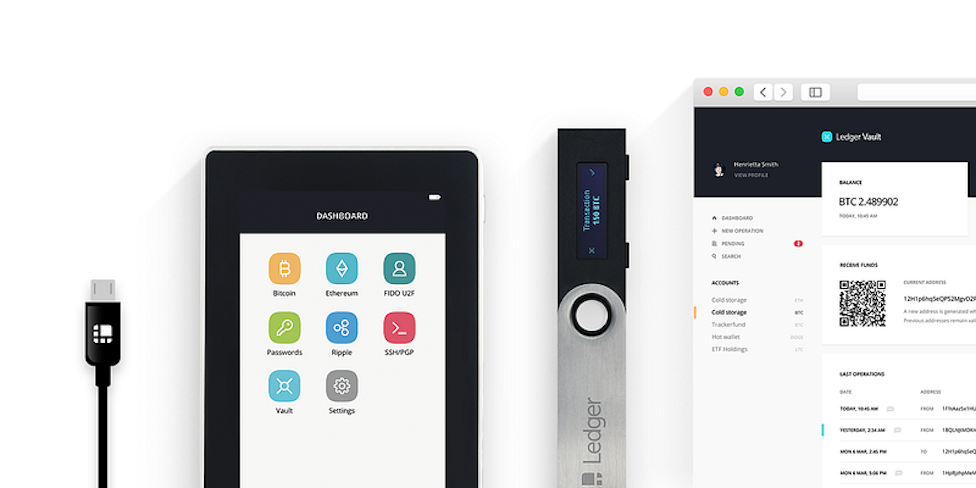We are excited to announce today that Draper Esprit is leading a $75 million series B round in Ledger.

“We imagine a group of generals of the Byzantine army camped outside an enemy city, each division commanded by its own general. These generals can communicate with one another only by messenger. After observing the enemy, they must decide upon a common plan of action. However, some of the generals may be traitors, trying to prevent the loyal generals from reaching agreement. The generals must have an algorithm that:
A. All loyal generals agree on the same plan of action.
B. A small number of traitors cannot cause the loyal generals to adopt a bad plan.”
The Byzantine Generals Problem, originally published in 1982, is a longstanding problem in computer science. At its most basic, it asks how to create a system of trust between unrelated parties over an untrusted network. Blockchain in general, and cryptocurrencies in particular, are solutions to this exact problem.
The practical consequences of solving this problem are hard to overemphasise. It gives us a way of transferring unique pieces of digital property to each other in a system which gains its legitimacy by enabling everyone to see that the transfer has taken place.
The digital property that can be transferred include smart contracts, digital ownership (to houses, for example), bonded identity services and, of course, digital money. All these can be transferred through a distributed network that no longer relies on a centralised bank or broker, without compromising the legitimacy of ownership or the validity of the transaction.
Cryptocurrency: the security landscape
2017 was the year that cryptocurrencies became a new asset class; shifting from easily disregarded to hard to ignore. A strong diversification in the spectrum of investors has fuelled the market. The increasing number of crypto products and services that have emerged (exchanges, storage solutions, derivatives and future contracts) also signal a market that is starting to mature. While cryptocurrencies are in their infancy, they have been understandably volatile. However the fundamental characteristics that underpin it: the technology, the decentralised network, and the cryptographic code present an underlying value which would be unwise to overlook.
One of the more important long- term challenges crypto assets of all kinds must face is security. As the market has developed, so has the number of hacks and the amount of fraud; cyber attacks occasionally bring down exchanges and wallets. Cyber attacks have included anything from attacking an entire digital exchange, to individual software wallets. In this environment, security is not a feature, it’s the cornerstone of its future success.
One key point of attack is the “end point”, where the private keys of individual investors could be stolen. Every cryptocurrency holder has a private key that authenticates their identity and allows them to exchange units. Without the key, the holder can’t spend or convert their currency. While this is a critical security feature that reduces theft and unauthorised use, losing a private key is the digital equivalent of losing real cash and hackers are increasingly seeking to steal private keys stored online. We believe that offline, or “cold”, storage for private keys is emerging as the most secure solution.
Introducing Ledger
Ledger, a Paris-based company that was founded by a team of crypto and smart card experts, solves this exact problem. Ledger’s products provide unprecedented security for crypto assets (currencies, digital identities etc) by securing a user’s private keys.

The company have developed two main hardware products: the Ledger Nano S and the Ledger Blue, both of which enable users to store their keys offline. They will also launch a new product: the Ledger Vault, enabling hedge funds, banks and family offices to manage their crypto assets, due to high demand. All these products are underpinned by a unique technology: an Operating System (OS) specifically designed to run on any secure hardware and to support any crypto asset.
By building a cold storage solution, the company offers users the safest solution, enabling crypto owners to keep full ownership of their digital assets, without the need for third party intervention. The hardware wallets isolate the private keys from computers or smartphones, which are easily hackable.
Building a global syndicate for a truly global company
We are excited to announce today that Draper Esprit is leading a $75 million series B round in Ledger.

Pascal, Eric, Nicolas and the wider team have shown truly exceptional growth over the last year to meet unprecedented demand, having sold over 1 million hardware wallets from across 165 countries. The team, now over 80 employees across France and the US, have managed to recruit some of the best engineering talent from organisations such as Gemaltoand French smart card experts, such as Oberthur Technologies. Simon Cook, CEO of Draper Esprit, will join their board to support the Ledger team as they scale rapidly.
Since the 1990s, France has been a global leader in smartcard technology. Ledger continues this long history of French technical excellence and join a host of European deeptech companies we have long been investing in, including Movidius, Cambridge Silicon Radio, Icera, Displaylink, nCipher, and more recently, Graphcore.
Cryptoassets are, by definition, a global asset class. It is for this reason that we are delighted that we are leading an international group of top tier investors. Our very own Draper Network have participated, bringing in funds, network and skills from China to the US. Tim Draper, one of the largest owners of bitcoin and an early investor in Skype, Baidu and Tesla, lead the deal from their side. We are also glad that top funds FirstMark Capital (New York), Cathay Capital (China) and Korelya Capital (France and South Korea) have joined the round.
We look forward to partnering with Ledger as they accelerate on their mission to secure all crypto assets globally.
Eleonore Butler, Lead investor on the deal
Simon Cook, Board member of Ledger
To read more about the deal, check out what Tim Draper has to say via the Draper Network’s recent post.






